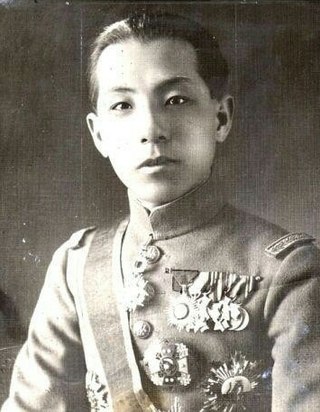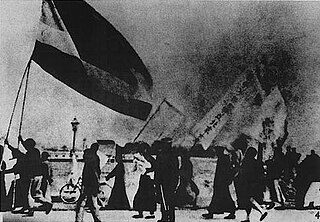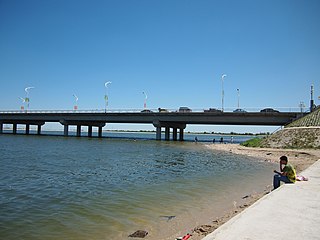Related Research Articles

Zhang Xueliang was a Chinese general who in 1928 succeeded his father Zhang Zuolin as the commander of the Northeastern Army. He is best known for his role in the Xi'an Incident in 1936, in which he arrested Chiang Kai-shek and forced him to form a Second United Front with the Chinese Communist Party against the Japanese.

Chinese nationalism is a form of nationalism in which asserts that the Chinese people are a nation and promotes the cultural and national unity of all Chinese people. According to Sun Yat-sen's philosophy in the Three Principles of the People, Chinese nationalism is evaluated as multi-ethnic nationalism, which should be distinguished from Han nationalism or local ethnic nationalism.

The Xi'an Incident was a major Chinese political crisis from 12 to 26 December 1936. Chiang Kai-shek, leader of the Nationalist government of China, was placed under house arrest in the city of Xi'an by a Nationalist army he was there to review. Chiang's captors hoped to end the Chinese Civil War and confront Japanese imperial expansion into Chinese territory. After two weeks of intense negotiations between Chiang, his captors, and representatives of the Chinese Communist Party (CCP), Chiang was released with a verbal promise to end the civil war and put up a firmer resistance to Japan.

The Jinan incident or 3 May Tragedy began as a 3 May 1928 dispute between Chiang Kai-shek's National Revolutionary Army (NRA) and Japanese soldiers and civilians in Jinan, the capital of Shandong province in China, which then escalated into an armed conflict between the NRA and the Imperial Japanese Army.

Tongliao is a prefecture-level city in eastern Inner Mongolia, People's Republic of China. The area is 59,535 square kilometres (22,987 sq mi) and as of the 2020 census, its population was 2,873,168. However, the city proper made of Horqin district, had 921,808 inhabitants. The city was the administrative centre of the defunct Jirem League.
Akira Iriye is a Japanese-born American historian and orientalist. He is a historian of diplomatic history, international, and transnational history. He taught at University of Chicago and Harvard University until his retirement in 2005.

After the Japanese invasion of Manchuria, and until 1933, large volunteer armies waged war against Japanese and Manchukuo forces over much of Northeast China.

The Northeast Counter-Japanese United Army, also known as the NAJUA or Northeast Anti-Japanese United Army, was the main Counter-Japanese guerrilla army in Northeast China (Manchuria) after the Japanese invasion of Manchuria in 1931. Its predecessors were various Counter-Japanese volunteer armies organized by locals and the Manchuria branches of the Chinese Communist Party (CCP). In February 1936, the CCP, in accordance with the instructions of the Communist International, issued The Declaration of the Unified Organization of Northeast Counter-Japanese United Army and marked the official formation of the organization.
The Northeast People's Counter-Japanese Volunteer Army was led by Tang Juwu, formerly the commander of a Northeastern infantry regiment, interned by the Japanese at the beginning of the invasion of Manchuria. It was created by the Northeast National Salvation Society that had appointed Tang as commander following his escape from the Japanese, and helped him link with the local forces which others were organising. Tang also made use of his personal contacts with police chiefs, officials, local gentry militias and the leaders of the Big Swords Society. Tang was able to organize a force which threatened the region to the east of Mukden and communications with Korea.

Zhang Chengzhi is a contemporary Hui Chinese author. Often named as the most influential Muslim writer in China, his historical narrative History of the Soul, about the rise of the Jahriyya (哲合忍耶) Sufi order, was the second-most popular book in China in 1994.
Liangping Airport, also called Liangshan Airport, is a former dual-use military and civil airport, located north of Liangping District in Chongqing Municipality, China. It served the city of Wanxian from July 1988 until May 2003, when all civil flights were transferred to the new Wanzhou Wuqiao Airport.
Akira Fujiwara was a Japanese historian. His academic speciality was modern Japanese history and he was a professor emeritus at Hitotsubashi University. In 1980 he became a member of the Science Council of Japan and was a former chairman of the Historical Science Society of Japan.

Counter-Japanese Military and Political University, also commonly known as Kàngdà (抗大) and Kangri Junzheng University (抗日军政大学), was a comprehensive public university located in Yan'an, Shaanxi, the headquarters of the Chinese Communist Party during the Second Sino-Japanese War. Its former site has been converted to a memorial hall.
Parks M. Coble, Jr. is an academic specializing in the political, economic, social and business history of 20th century China. He is the James L. Sellers Professor of History at the University of Nebraska, Lincoln, where he has taught since 1976. He has also held numerous fellowships and is an Associate-in-research at the Fairbank Center for Chinese Studies at Harvard University.

The Reminiscences of Tsiang T'ing-fu is an English memoir written by Tsiang Tingfu. It contains chapters on Tsiang's family background, studying in the United States, teaching in Nankai University and Tsinghua University, visiting Moscow, and others. Due to the death of Tsiang on 9 October 1965, the oral autobiography was an unfinished project and was not completed until 1974 when it was embellished and revised by Anita O'Brien.
Gregory J. Moore is an American political scientist specializing in international relations, international security and Chinese politics and foreign policy. He teaches international politics and policy at Patrick Henry College in Purcellville, Virginia. He was previously a Stanton Fellow at the U.S. Air Force Academy in Colorado Springs, CO. Prior to that he was a professor of global studies and politics at Colorado Christian University, and taught political science and international relations at universities in China such as Zhejiang University and University of Nottingham Ningbo for roughly a decade.
Yang Jianhua is a Chinese archaeologist. She held the position of Professor of Archaeology at Jilin University from 1996 and is known as one of the first Mainland Chinese scholars to research world archaeology, including Mesopotamia and Siberia.

Five Identifications as a term has been mentioned in many Chinese government and Chinese Communist Party (CCP) websites. It was proposed by the general secretary of the CCP, Xi Jinping. He has repeatedly emphasized its importance.
Ethnic nationalism in Japan or minzoku nationalism means nationalism that emerges from Japan's dominant Yamato people or ethnic minorities.
Wu Jinghua was a Chinese politician of Yi ethnicity who served as Communist Party Secretary of Xizang between 1985 and 1988.
References
- Iriye, Akira (1993). "Facing Japan: Chinese Politics and Japanese Imperialism, 1931–1937. By Parks M. Coble. [Cambridge MA: Council on East Asian Studies, Harvard University, 1992. 492 pp. £24.00.]". China Quarterly . 133: 170–171. JSTOR 654249.
- Macfarlane, Alan (1993). "Facing Japan: Chinese Politics and Japanese Imperialism, 1931-1937" (PDF). The Historical Journal . 36 (2): 431. JSTOR 2639657.
Notes
- 1 2 Iriye, p. 170.
- ↑ "Parks M. Coble CV" (PDF). University of Nebraska–Lincoln . Retrieved 2024-02-03.
- ↑ Iriye, p. 171.
- ↑ Macfarlane, p. 431.